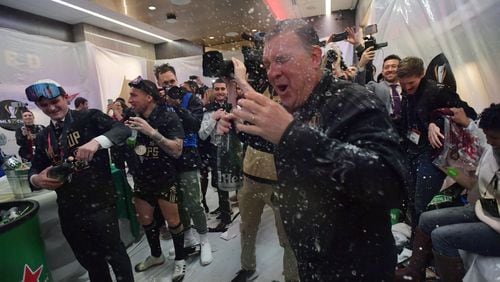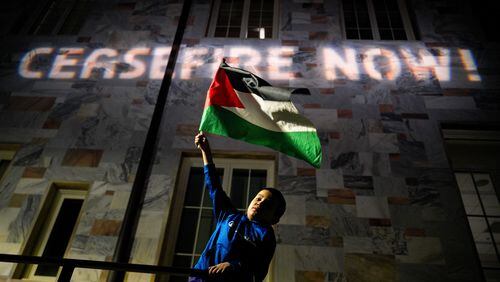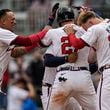It can be easy to forget amid winning the MLS Cup and the individual accolades accumulated that Atlanta United’s coaches and players have families.
Life isn’t all soccer all the time.
But Gerardo Martino came close, which is among the reasons that he decided to walk away from managing the MLS club after two successful seasons in which he helped take it from a start-up working out on the wind-swept soccer pitches in Bradenton, Fla., to a champion with a 2-0 victory over Portland at Mercedes-Benz Stadium in 23 months.
Before flying home to Rosario, Argentina, on Wednesday, Martino gave an exclusive final interview to The Atlanta Journal-Constitution.
The former manager of Barcelona and Argentina discussed his reported ties to the Mexican national team, his lack of ties to the U.S. men’s national team, how MLS can improve and if he plans to visit.
Martino also wanted to say thank you.
“I really want to thank Arthur (Blank), Darren (Eales), Carlos (Bocanegra) and Paul (McDonough) for having confidence in me and a thank you to everyone at the club who has helped us,” Martino said. “A profound thank you to my coaching staff and a big thank you to my players. The success is a tribute to players from both last year to this season.”
Questions and answers have been edited for clarity in some cases.
Q. Why leave after winning a championship?
A. As I've said over the past few weeks, this past year, since I arrive in early January, I haven't had chance to go back to Argentina once to visit family.
This coming year, I couldn’t be able to stand another year like that, especially with all of the tournaments.
You have to be here every day. It’s the labor of the job. I didn’t think I could do another year.
Q. Is Mexico next?
A. It's possible. Not 100 percent.
Q. Do you have a deadline?
A. No. There's no deadline. But I can't say it's totally official.
Q. Was there a moment when you realized you were ready to move on, like missing a birthday?
A. There wasn't a special moment. It just accumulated as the year went on. The second half of the season was very long.
Q. In October, you said that no one from the U.S. men’s national team had reached out to you about its then-vacant managerial position. Did anyone ever reach out?
A. Never. Officially and unofficially never.
Q. Did that surprise you?
A. No. it doesn't surprise me in these types of situations. The people in charge make their decisions and that's it.
Q. It surprised me. You’d think that even if you weren’t interested, someone would reach out to ask your opinion.
A. I agree with you on that. It's possible they did reach out to other coaches. But they didn't reach out to me.
The decision they made (Gregg Berhalter) is a great coach.
Q. Was that job interesting to you?
A. I just want to say that aside from Atlanta United, any national team gives you a little bit more free time. I don't want to get completely into the analysis. There are are different responsibilities compared to clubs and national team.
Q. But was it interesting?
A. It's not my place to comment on that because I was never close to it.
Q. What’s the biggest piece of advice you would give to managers new to MLS?
A. Not advice, but my opinion is to learn and to understand as much about the league as they can. Talk to people to get an understanding, but to still follow their own ideas.
Q. Biggest piece of advice you would give to managers new to living in the U.S?
A. Learn English. It's fundamental.
Q. What’s the biggest headache about coaching in MLS?
A. I think the effort that I made with a huge amount of help from Dario (Sala) to get our message across to all of our players.
Q. Why was that difficult? What made that difficult?
A. I don't want to say it was difficult. We made a big effort. Dario made a big effort of getting the message to the English-speaking players.
Very intelligent players such as Parkie (Michael Parkhurst), Jeff (Larentowicz), Kevin (Kratz), Julian (Gressel) on the team who I noticed in the second year started understanding Spanish. The guys would know what we were talking about.
Those guys are so smart they knew what we were doing without needing a translation.
Q. Was there a moment in MLS Cup that you realized your team was going to win?
A. I started to seriously think we had a chance to win the league in the first training session after we lost at Toronto and the way we played the first leg at New York City.
Q. After the MLS Cup, Jeff asked me when I thought the team showed that it could win the MLS Cup. I told him the first 10 minutes of the first playoff game at NYCFC.
A. After two years, finally we agree on something!
Q. What will you do with the medal and ring (from the MLS Cup)?
A. I'll use the ring, for sure. And I'll put the medal where I have all my soccer trophies in Rosario. There's nothing better than keeping my special places in the place I love most.
Q. How much fun was it to hammer the Golden Spike at the parade?
A. Some of my friends and my family made fun of me because they said it looked like the first time in my life that I picked up a hammer.
Saturday and Monday were very special, very emotional days.
I’m leaving Atlanta the same way I arrived, with great affection for the fans and a mutual respect.
Q. You love the NBA, so an NBA reference in this question: Can this franchise become the Golden State Warriors of MLS?
A. Those kind of dynasties are very hard to achieve in soccer.
Q. What does MLS need to do immediately to continue its growth?
A. For me, it's to review the academy system so that this league isn't just bringing in good foreign players but that the academies are becoming an integral part of the league. It's not just cases like Red Bulls and Kansas City.
That would really help the national team to have a percentage of Americans to go along with the foreign players.
Q. Do you plan on visiting Atlanta again?
A. Yes. next year.
Q. Already have something planned?
A. No. I'd like to come back next year to see a game or something interesting where we can come see Atlanta United, the Falcons and the Hawks.
About the Author







